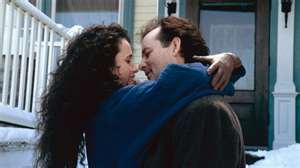Groundhog Day: A Do-over
In Western PA, we take Groundhog Day pretty seriously. I have a friend who visits Punxsutawney every year for the Groundhog Day Celebration. The closest I have come to Punxsutawney and Groundhog Day is  watching the movie “Groundhog Day” starring Bill Murray. In this movie, Phil (not the groundhog but a news reporter played by Bill Murray) found himself reliving Groundhog Day over and over. Self-absorbed and arrogant, he spent his do-over days doing everything he “always dreamed of” until he discovered that living only for himself did not bring joy, self-absorbed living did not provide escape from the “treadmill” of life. Instead, he discovered that this lifestyle simply pulled him deeper into the despair and drudgery of a lonely, meaningless life. He then decided to do whatever he could to improve his life and become more attractive to his coworker, an attractive female. He learned about her interests so he could talk with her about them. He began to enjoy those activities that she enjoyed, just because she enjoyed them. As he focused on knowing his coworker, he became less self-absorbed and more invested in the joys of selfless relationships. Eventually, he found that showing interest in others and learning how to build true intimacy moved him off the treadmill of a self-centered life and into the joyful journey of companionship.
watching the movie “Groundhog Day” starring Bill Murray. In this movie, Phil (not the groundhog but a news reporter played by Bill Murray) found himself reliving Groundhog Day over and over. Self-absorbed and arrogant, he spent his do-over days doing everything he “always dreamed of” until he discovered that living only for himself did not bring joy, self-absorbed living did not provide escape from the “treadmill” of life. Instead, he discovered that this lifestyle simply pulled him deeper into the despair and drudgery of a lonely, meaningless life. He then decided to do whatever he could to improve his life and become more attractive to his coworker, an attractive female. He learned about her interests so he could talk with her about them. He began to enjoy those activities that she enjoyed, just because she enjoyed them. As he focused on knowing his coworker, he became less self-absorbed and more invested in the joys of selfless relationships. Eventually, he found that showing interest in others and learning how to build true intimacy moved him off the treadmill of a self-centered life and into the joyful journey of companionship.
 watching the movie “Groundhog Day” starring Bill Murray. In this movie, Phil (not the groundhog but a news reporter played by Bill Murray) found himself reliving Groundhog Day over and over. Self-absorbed and arrogant, he spent his do-over days doing everything he “always dreamed of” until he discovered that living only for himself did not bring joy, self-absorbed living did not provide escape from the “treadmill” of life. Instead, he discovered that this lifestyle simply pulled him deeper into the despair and drudgery of a lonely, meaningless life. He then decided to do whatever he could to improve his life and become more attractive to his coworker, an attractive female. He learned about her interests so he could talk with her about them. He began to enjoy those activities that she enjoyed, just because she enjoyed them. As he focused on knowing his coworker, he became less self-absorbed and more invested in the joys of selfless relationships. Eventually, he found that showing interest in others and learning how to build true intimacy moved him off the treadmill of a self-centered life and into the joyful journey of companionship.
watching the movie “Groundhog Day” starring Bill Murray. In this movie, Phil (not the groundhog but a news reporter played by Bill Murray) found himself reliving Groundhog Day over and over. Self-absorbed and arrogant, he spent his do-over days doing everything he “always dreamed of” until he discovered that living only for himself did not bring joy, self-absorbed living did not provide escape from the “treadmill” of life. Instead, he discovered that this lifestyle simply pulled him deeper into the despair and drudgery of a lonely, meaningless life. He then decided to do whatever he could to improve his life and become more attractive to his coworker, an attractive female. He learned about her interests so he could talk with her about them. He began to enjoy those activities that she enjoyed, just because she enjoyed them. As he focused on knowing his coworker, he became less self-absorbed and more invested in the joys of selfless relationships. Eventually, he found that showing interest in others and learning how to build true intimacy moved him off the treadmill of a self-centered life and into the joyful journey of companionship. Phil quit living selfishly after he  was forced into an automatic do-over. Eventually, he took advantage of that do-over and learned the skills necessary to pursue intimacy with others. In pursuing those skills, Phil found greater joy in life…after all, the greatest joys in life come through relationship. Like Phil, we have opportunities for do-overs as well. Every time we commit some self-centered act (intentionally or accidentally) that strains our relationships, we can call for a do-over. Each time we stop and request a do-over, we gain stronger relational skills and move deeper into the joyful journey of intimacy; and, what better place to practice these intentional do-overs than with family? Here are some of the skills that Phil learned by taking advantage of his “Groundhog Day Do-over.”
was forced into an automatic do-over. Eventually, he took advantage of that do-over and learned the skills necessary to pursue intimacy with others. In pursuing those skills, Phil found greater joy in life…after all, the greatest joys in life come through relationship. Like Phil, we have opportunities for do-overs as well. Every time we commit some self-centered act (intentionally or accidentally) that strains our relationships, we can call for a do-over. Each time we stop and request a do-over, we gain stronger relational skills and move deeper into the joyful journey of intimacy; and, what better place to practice these intentional do-overs than with family? Here are some of the skills that Phil learned by taking advantage of his “Groundhog Day Do-over.”
 was forced into an automatic do-over. Eventually, he took advantage of that do-over and learned the skills necessary to pursue intimacy with others. In pursuing those skills, Phil found greater joy in life…after all, the greatest joys in life come through relationship. Like Phil, we have opportunities for do-overs as well. Every time we commit some self-centered act (intentionally or accidentally) that strains our relationships, we can call for a do-over. Each time we stop and request a do-over, we gain stronger relational skills and move deeper into the joyful journey of intimacy; and, what better place to practice these intentional do-overs than with family? Here are some of the skills that Phil learned by taking advantage of his “Groundhog Day Do-over.”
was forced into an automatic do-over. Eventually, he took advantage of that do-over and learned the skills necessary to pursue intimacy with others. In pursuing those skills, Phil found greater joy in life…after all, the greatest joys in life come through relationship. Like Phil, we have opportunities for do-overs as well. Every time we commit some self-centered act (intentionally or accidentally) that strains our relationships, we can call for a do-over. Each time we stop and request a do-over, we gain stronger relational skills and move deeper into the joyful journey of intimacy; and, what better place to practice these intentional do-overs than with family? Here are some of the skills that Phil learned by taking advantage of his “Groundhog Day Do-over.” · Be curious about those you love. Learn about their interests. When you talk with family members, spend some time focused on them, their day, their interests, and their dreams.
· Learn to use repair statements when conflict occurs. When you do something that hurts a family member, say “I’m sorry.” When you say something that brings a painful or hurt expression to a family member’s face, stop and say, “Wait that came out wrong. Let me start over” or “I love you. Let me say that in a more loving way.”
· Practice intentional acts of kindness toward family. Open the door for them. Give up your desire for an evening enjoying what interests your family. Offer to do a chore for one of your family members. Thank family members for cooking dinner, washing clothes, cleaning up, or any other task they complete that benefits you.
· Practice intentional acts of kindness toward those outside your family. Your family will admire you and love you even more when they witness you showing kindness to others. Such actions reveal a strong character of integrity… and integrity is the ultimate in attractiveness.
You might add your own ideas to this list as you watch the movie or simply go through your day. Most important, enjoy your own do-over the next time you find yourself stuck in the same argument or stress-filled discussion time after time. You can begin your do-over by reading the four suggestions above.
I have a friend who visits Punxsutawney every year for the Groundhog Day Celebration. The closest I…. Oh wait, déjà vu. Haven’t we been here before? Oh well, do-over…I’ll get this right yet.